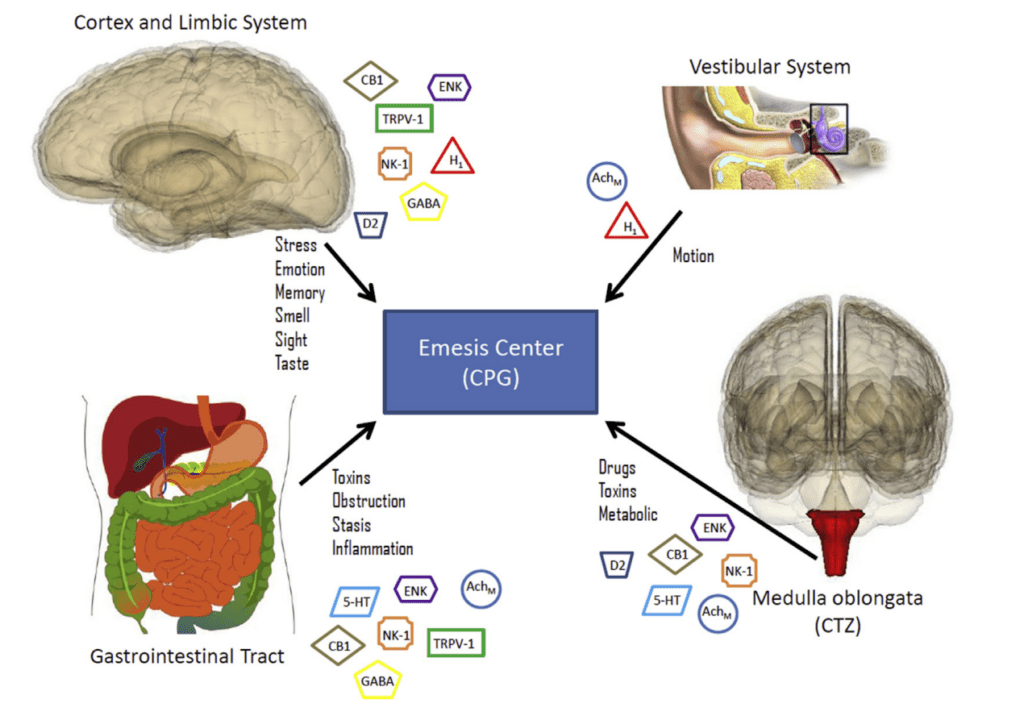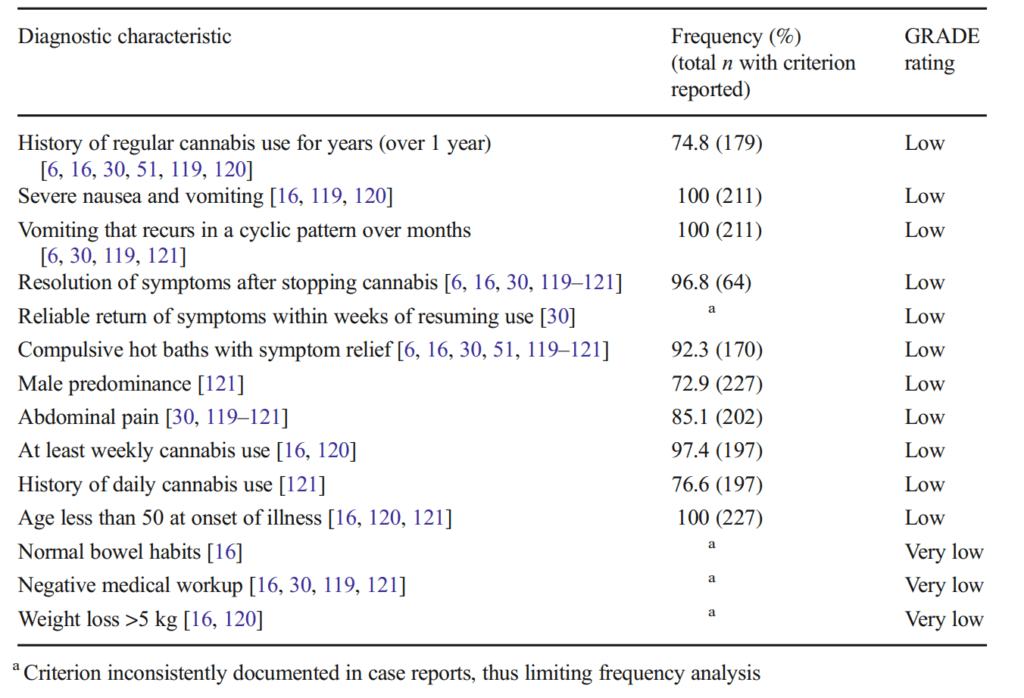Now I will tell you about the potentially first physiological and hazardous syndrome caused by cannabis. This is known as the Cannabis or Cannabinoid Hyperemesis Syndrome, commonly abbreviated as CHS. The fact that it appeared in the optics of medical professionals and every year more and more articles are dedicated to this topic, once again shows us that without moderation in consumption and a meaningful approach, even a relatively safe substance can harm health.
What is cannabinoid hyperemesis syndrome?
Cannabinoid hyperemesis syndrome (CHS) is a condition that occurs in some individuals who use cannabis (marijuana) regularly. It is characterized by recurrent episodes of severe nausea, vomiting, and abdominal pain that can last for hours or even days.
People often ask and google the question – what is CHS, because this is a fairly new pathological condition. It was first described in 2004 by Allen et al in the article Cannabinoid hyperemesis: cyclical hyperemesis in association with chronic cannabis abuse.
The exact cause of CHS is not well understood, but it is thought to be related to the prolonged use of cannabis, particularly high potency strains. The active ingredient in cannabis, THC (delta-9-tetrahydrocannabinol), is believed to play a role in the development of CHS.
It is important to note that not all individuals who use cannabis will develop CHS, and the risk of developing this condition appears to be relatively low. However, if a person is experiencing recurrent episodes of severe nausea, vomiting, and abdominal pain and has a history of cannabis use, they should seek medical attention to rule out CHS and other possible causes.
What causes cannabinoid hyperemesis syndrome?

The exact cause of cannabis hyperemesis syndrome is not well understood, and research is ongoing to better understand this condition. However, it is believed to be related to the prolonged use of cannabis, particularly high potency strains that are high in THC.
THC binds to cannabinoid receptors in the brain and digestive system, which can have a variety of effects on the body, including nausea and vomiting. It is thought that chronic stimulation of these receptors by THC may lead to a disruption in the normal functioning of the digestive system, resulting in the symptoms of CHS.
Additionally, it is believed that the effects of THC on the body’s temperature regulation system may also play a role in the development of CHS. THC has been shown to lower body temperature, and it is thought that this may contribute to a disturbance in the body’s ability to regulate temperature, leading to the symptoms of CHS.
What are the symptoms of cannabinoid hyperemesis syndrome?

Cannabis hyperemesis syndrome symptoms typically involve recurrent episodes of severe nausea, vomiting, and abdominal pain, which can last for hours or even days.
Other common symptoms of CHS may include:
- Abdominal discomfort or cramping
- Weight loss
- Dehydration
- Loss of appetite
- Body aches
- Headaches
- Irritability or anxiety
- Decreased body temperature
CHS presents in three main phases: prodromal, hyperemetic, and recovery. During the prodromal phase, patients may experience mild nausea and abdominal discomfort, typically in the mornings. To alleviate these symptoms, people may resort to taking hot showers or increasing their cannabis use.
The hyperemetic phase is characterized by more severe symptoms, and people often present to the emergency department with complaints of nausea, vomiting, or abdominal pain. Retching episodes can occur up to 5 times per hour, and this phase can last from 1 day to 10 days. Prolonged hot water exposure or repetitive vomiting may result in burns or pneumomediastinum.
During the recovery phase, patients slowly regain their nutritional intake, weight, and normal bathing patterns. However, many patients may relapse in their cannabis use, leading to a reentry into the prodromal phase.
It is worth noting
It is worth noting especially for those who are wondering – is cannabis hyperemesis syndrome real? Yes. The data for the last ten years suggests that this is a real pathological condition. But if you try to find this syndrome in the International Classification of Diseases (ICD), it will not give results. This is because this is a fairly new phenomenon regarding how pathologies get into such classifiers. That’s why cannabis hyperemesis syndrome icd missed, and not because it doesn’t exist.
How is cannabinoid hyperemesis syndrome diagnosed?

Cannabinoid hyperemesis syndrome can be difficult to diagnose, as it shares many symptoms with other gastrointestinal disorders. Additionally, many individuals with CHS may be reluctant to disclose their cannabis use, which can make it even more challenging to identify the condition.
To diagnose CHS, a healthcare provider will typically perform a thorough medical history and physical exam, including a review of symptoms and a discussion of any recent cannabis use. Laboratory tests may also be ordered to rule out other possible causes of the symptoms, such as infections or other gastrointestinal disorders.
Cecilia J. Sorensen et al in their systematic review Cannabinoid Hyperemesis Syndrome: Diagnosis, Pathophysiology, and Treatment highlight the following symptoms and their frequency of occurrence:

Ultimately, the diagnosis of CHS is based on a combination of clinical symptoms, medical history, and ruling out other possible causes of the symptoms. If a person is experiencing recurrent episodes of severe nausea, vomiting, and abdominal pain and has a history of cannabis use, they should seek medical attention to rule out CHS and other possible causes.
How is cannabinoid hyperemesis syndrome treated?

The most effective cannabis hyperemesis syndrome treatment is to stop using cannabis. Yep, that it is. This can be difficult for some individuals, as cannabis use can be addictive, and stopping use can lead to withdrawal symptoms. However, it is essential to discontinue cannabis use to manage CHS symptoms effectively. At least for the duration of treatment and stabilization of the condition.
In addition to discontinuing cannabis use, there are several other ways for CHS medical treatment, including:
Anti-nausea medication: Medications such as Ondansetron and Promethazine can be used to relieve nausea and vomiting.
Pain medication: Pain relievers such as acetaminophen or ibuprofen can help manage abdominal pain.
Capsaicin cream: Applying Capsaicin cream to the abdomen may help relieve symptoms in some individuals.
Intravenous fluids: These are often given to prevent dehydration, which can be a complication of CHS.
Behavioral therapy: Therapy, such as cognitive-behavioral therapy (CBT), can help individuals manage symptoms and cope with the emotional effects of CHS.
It is important to note that treatment for CHS should be individualized, and a healthcare provider may recommend different treatments based on the severity of symptoms and the individual’s medical history.
When should I call my healthcare provider?
If you have used cannabis in the past and are experiencing recurrent episodes of severe nausea, vomiting, and abdominal pain, you should call your healthcare provider. These symptoms may indicate CHS or another medical condition that requires prompt attention.
Additionally, you should seek medical attention if you experience any of the following symptoms:
Dehydration: Signs of dehydration include dry mouth, dark urine, dizziness, fatigue, and rapid heartbeat.
High fever: A high fever can indicate an infection, which can be a complication of CHS.
Severe abdominal pain: Severe, persistent abdominal pain may indicate a more serious medical condition, such as pancreatitis or an intestinal blockage.
Fainting or loss of consciousness: Fainting or loss of consciousness can be a sign of a more serious underlying condition, such as an electrolyte imbalance or kidney damage.
Symptoms that do not improve with home treatment: If your symptoms do not improve with home treatment, such as drinking fluids and taking over-the-counter medications, you should seek medical attention.
It is important to seek medical attention promptly if you experience any of these symptoms or have concerns about your health. Your healthcare provider can help diagnose and treat any underlying medical conditions, including CHS, and provide guidance on how to manage your symptoms.
When should I go to the ER?
You should go to the emergency room (ER) immediately if you are experiencing severe symptoms of CHS or if your symptoms are accompanied by any of the following:
Signs of dehydration: including dry mouth, excessive thirst, dizziness, weakness, fatigue, and decreased urine output.
High fever: A high fever (above 101°F or 38.3°C) can indicate an infection, which can be a complication of CHS.
Severe abdominal pain: Severe, persistent abdominal pain may indicate a more serious medical condition, such as pancreatitis or an intestinal blockage.
Fainting or loss of consciousness: Fainting or loss of consciousness can be a sign of a more serious underlying condition, such as an electrolyte imbalance or kidney damage.
Rapid heart rate: A rapid heart rate (above 120 beats per minute) can be a sign of dehydration or other complications.
If you are experiencing any of these symptoms, you should seek medical attention immediately. In some cases, CHS can lead to severe dehydration, electrolyte imbalances, and other complications that require emergency treatment.
What are possible complications of cannabinoid hyperemesis syndrome?

CHS can lead to several complications if left untreated or if symptoms are not managed effectively. Some of the possible complications of CHS include:
Dehydration: Recurrent episodes of vomiting and diarrhea can lead to dehydration, which can be severe and require hospitalization.
Electrolyte imbalances: Frequent vomiting and diarrhea can lead to imbalances in electrolytes, such as potassium, sodium, and chloride, which can be life-threatening in severe cases.
Kidney damage: Severe dehydration and electrolyte imbalances can damage the kidneys, leading to kidney failure in rare cases.
Malnutrition: Chronic nausea and vomiting can lead to weight loss and malnutrition, which can be particularly concerning for individuals with pre-existing nutritional deficiencies or chronic illnesses.
Psychological effects: CHS can be a frustrating and debilitating condition, and the chronic nature of the symptoms can lead to anxiety, depression, and other psychological effects.
What can I do to prevent cannabinoid hyperemesis syndrome?

The best way to prevent CHS is to avoid or limit cannabis use. But it’s too obvious and difficult to apply in real life for many people. While cannabis is generally considered safe, long-term, heavy use can increase the risk of developing CHS. If you do choose to use cannabis, there are several steps you can take to reduce your risk of developing CHS:
- Limit use: Avoid using cannabis excessively or on a daily basis, especially high-THC strains.
- Alternate forms: Consider using cannabis in alternate forms such as edibles, oils, or vaporizers instead of smoking, which may be less likely to cause CHS.
- Stay hydrated: Make sure to stay well-hydrated, especially during cannabis use, to prevent dehydration, which can trigger CHS.
- Take breaks: Take regular breaks from cannabis use to give your body time to recover.
- Seek medical attention: If you experience recurrent episodes of severe nausea, vomiting, and abdominal pain, seek medical attention to rule out CHS and other possible causes.
Overall, the best way to prevent CHS is to use cannabis responsibly and in moderation.
Does cannabis hyperemesis syndrome have long-term effects?

The long-term effects of CHS are not well understood, as research on the condition is still relatively limited. However, there are some concerns about potential long-term effects, particularly for individuals who continue to use cannabis despite experiencing CHS symptoms.
One of the main concerns is the potential for dehydration and electrolyte imbalances to cause long-term damage to the kidneys or other organs. This can occur if CHS symptoms are not managed promptly or if an individual continues to use cannabis despite experiencing symptoms. Chronic vomiting and diarrhea can also lead to weight loss and malnutrition, which can have long-term health consequences.
In addition, there is some evidence to suggest that CHS may be associated with changes in the gastrointestinal tract and the body’s endocannabinoid system. Some studies have found that frequent cannabis use may lead to changes in the gut microbiome and alterations in the expression of certain cannabinoid receptors, which could potentially have long-term effects on digestive health.
However, more research is needed to fully understand the long-term effects of CHS and the potential health risks associated with chronic cannabis use.
Conclusion

it is clear that cannabinoid hyperemesis syndrome is a relatively new medical condition that is associated with frequent and long-term cannabis use.
The exact causes of CHS are not well understood, but it is thought to be related to changes in the endocannabinoid system and gastrointestinal tract. There is no specific diagnostic test for CHS, but healthcare providers can diagnose the condition based on a patient’s symptoms, medical history, and cannabis use patterns.
Treatment for CHS typically involves supportive care, including fluid and electrolyte replacement, anti-nausea medication, and pain management. In severe cases, hospitalization may be necessary to manage symptoms and prevent complications.
To prevent CHS, it is recommended that individuals limit their cannabis use and seek medical attention promptly if they experience any symptoms of the condition. If you are experiencing CHS symptoms, it is important to seek medical attention to manage your symptoms and prevent complications.
It is really important for individuals who use cannabis to be aware of the potential risks and symptoms associated with the condition. And that’s why in the case of cannabis hyperemesis syndrome patient education is one of the main directions. This unpleasant and even dangerous condition can be avoided if you follow the simple rules of Harm Reduction for Cannabis.
By seeking medical attention promptly and following recommendations for responsible cannabis use, you can help prevent complications and promote your overall health and wellbeing.
✔️
This marks the finish of today’s session. It is my hope that this piece was enlightening.
If you desire to advance the growth of this blog, I suggest the following actions:
- Follow my Twitter.
- Circulate a link to this article among your associates.
- Give recognition to this blog on relevant platforms or discussion groups.
Should you identify any necessary additions or corrections in this article, feel free to initiate a dialogue with me via Contact Form. I am always open to communication.
I express my gratitude for your valuable time and consideration 🌿




